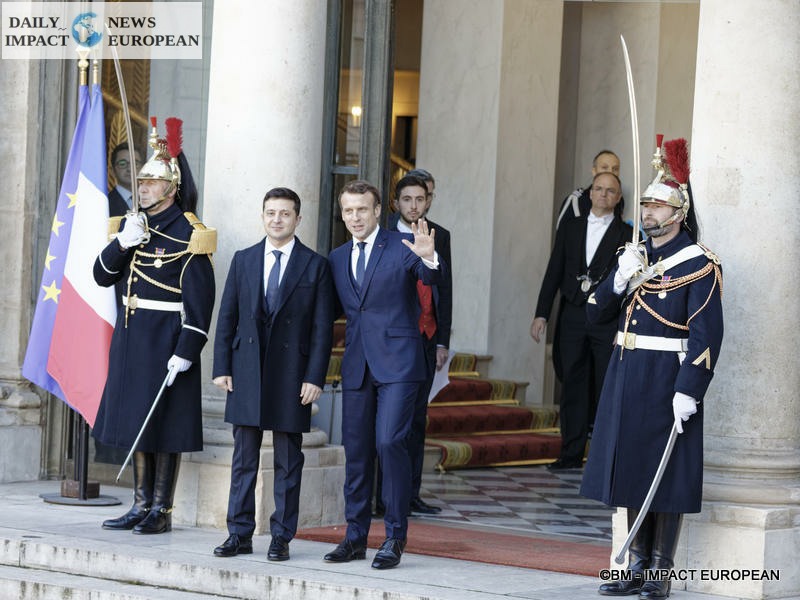After Moscow, the French president made a stopover in Kiev on Tuesday. Following talks with his Russian and Ukrainian counterparts, he believes he has received pledges of goodwill, despite the tensions.
Emmanuel Macron assured, Tuesday, to see « concrete solutions » to the Russian-Western crisis linked to Ukraine, claiming to have received pledges from Vladimir Putin so that there is no « additional escalation ».
Faced with tensions of a level rarely reached since the end of the Cold War, following the deployment of tens of thousands of Russian soldiers on the Ukrainian border, the French president successively met his Russian counterparts, for more than five hours Monday, then Ukrainian, three hours on Tuesday, in search of a diplomatic solution.
For his part, Volodymyr Zelensky announced that he expects a forthcoming summit with the Russian and French presidents and the German chancellor on the peace process in eastern Ukraine, preceded by a new meeting between advisers, this Thursday in Berlin.
The President of the Republic hopes to advance the peace negotiations as quickly as possible. He met German Chancellor Olaf Scholz this evening in Berlin.
Emmanuel Macron and Olaf Scholz have been in the last 48 hours, each on their side, fully mobilized on the file of the Ukrainian crisis. The German Chancellor has just returned from the United States, where he exchanged with Joe Biden. The French president arrives from Moscow and Kiev. In Kiev, Ukrainian President Volodymyr Zelenskyy thanked Emmanuel Macron several times for his involvement and assured him of his composure in the face of the Russian threat: « We are patient and it is important not only for Ukraine, but for all of Europe. On our patience depends the de-escalation ».
Emmanuel Macron has therefore obtained a basis for advancing the negotiations. He will share his analysis of the situation with Chancellor Scholz before a meeting with the Polish President, also present in Berlin. The road to de-escalation is still long…
The three countries are « united » to preserve peace in Europe « through diplomacy and through clear messages, as well as the common will to act together », assured German Chancellor Olaf Scholz who received the French and Polish Presidents, Emmanuel Macron and Andrzej Duda.
This working dinner in Berlin was the last stage of Emmanuel Macron’s diplomatic tour, which involved a long face-to-face with Vladimir Putin on Monday, then with Volodymyr Zelensky, the Ukrainian president, on Tuesday, in search of a diplomatic solution. in a context of tensions on a level rarely reached since the end of the Cold War.
Andrzej Duda said he believed it was possible « to avoid war », while Emmanuel Macron pleaded in favor of « a demanding dialogue with Russia », because it is « the only path that will make peace in Ukraine possible ». in short statements before their meeting.
On February 8, the United States Department of Defense announced that a first detachment of American soldiers had arrived in Romania, while tensions between Russia and the West around Ukraine are still high.
Information partially confirmed to the press by the Minister of National Defense of Romania, Vasile Dîncu: “A hundred American soldiers, specialists in charge of preparing the deployment of “the future contingent”, have already arrived […] The rest troops will not be long”. However, he did not provide further details on the timetable or the military bases where these soldiers will be stationed.
The Pentagon also claims that « a few hundred soldiers from the 82nd Airborne Corps were transferred to Poland from Fort Bragg, North Carolina. » « Around 1,700 soldiers will be deployed in Poland in the coming days, » said the press release published on February 7. John Kirby explained that American troops are arriving there at the moment and settling in with the aim of carrying out exercises with their “partners in Romania and Poland”. A member of NATO since 2004, Romania already hosts 900 American soldiers, 140 Italians and 250 Poles on its soil.
On the French side, Emmanuel Macron had declared that Paris would be ready to « commit to new missions » and had sent experts to Romania at the end of January, with a view to the possible deployment of troops. Armed Forces Minister Florence Parly said on January 29 that France was ready to “defend” countries close to Ukraine and mentioned sending troops to Romania. An approach which, according to her, would not be intended to « contribute to any military escalation ».
French President Emmanuel Macron’s visit to Russia was « positive » and brought « an element of detente » to the crisis between Westerners and Moscow over Ukraine, but did not lead to a « miracle », the President said on Tuesday. head of European diplomacy Josep Borrell.
« What is important for Russia is not Ukraine », it is « the security architecture in Europe » that the Russians « contest », he explained.
« They are putting pressure on Ukraine, but not with the aim of invading Ukraine. They are putting pressure on Ukraine in order to get talks on what matters to them, NATO enlargement and their security concerns, » he said.
Views: 3



More Stories
United Arab Emirates and Artificial Intelligence: Global Leadership and Strategic Partnerships with France
Premiere of « Gourou » at Pathé
Rétromobile 2026 – 50 Years of Automotive Heritage, Innovation, and Passion